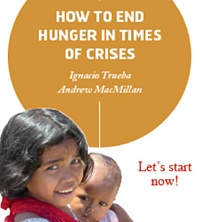|
 This
little book claims that the world’s food systems are badly
managed, to the great detriment of humanity. The situation
can, however, be greatly improved through simple, affordable
measures. This
little book claims that the world’s food systems are badly
managed, to the great detriment of humanity. The situation
can, however, be greatly improved through simple, affordable
measures.
Since 1945, food production per person has grown by 40%, and
there is now enough food for all 7 billion humans. But
chronic hunger forces 1 billion people into social
exclusion, illness and premature death, while another 1.5
billion face diseases induced by over-eating. At least 2
billion others suffer from vitamin and mineral deficiencies.
Thus, over half humanity needlessly faces health and
livelihood constraints because of bad nutrition. Strangely,
in spite of the vast human suffering, most governments
ignore the problem.
Even if enough food is produced, many of the production
methods are unsustainable, and huge losses occur between
field and table. Increasingly intensive farming systems are
narrowing biodiversity, degrading soils, polluting water
resources, and making irrigated areas salty. Over-fishing is
depleting oceanic fish stocks.
Most food is still grown by small-scale farmers, yet, in
spite of their vital role in our lives, many rural people in
developing countries suffer extreme deprivation.
Bad food management fuels the inter-related crises - food,
climate change, energy, environmental as well as economic
and financial - that have recently created so much
uncertainty across the world. Better food management can
help resolve these crises.
There are two major challenges. The first is to eradicate
hunger as soon as possible – ideally by 2025. The second is
to make food production and consumption truly sustainable,
preferably before 2050.
The quickest, most direct way to end hunger is to transfer
income through social protection programmes to the poorest
families to enable them to escape from the hunger trap and
become self-reliant. On average, this requires funding to
let them buy an extra 70 grams of food per day per family
member at a monthly cost of about US$2.50 each – or about
US$ 30 billion per year world-wide. This is not “welfare”
but an investment in human capital that generates positive
returns in terms of better health, longer life expectancy
(especially for children), and improved mental and physical
growth, reflected in higher learning abilities, work
capacities and resilience to shocks. It also increases
demand for food, stimulating local production.
Feeding an expected 9 billion people sustainably by 2050
will be easier if over-consumption and waste by higher
income consumers is curbed. The potential health,
environmental and climate change mitigation benefits are
huge and justify serious government action. The FAO forecast
of 70% extra food demand in 2050 could be cut to 50% by
falling birth rates, consumer education to induce lifestyle
and nutrition changes, compacts with food manufacturers and
retailers, and differential taxation to penalise luxury
foods with high ecological footprints and to favour
fair-trade and sustainable production. To encourage
governments to adopt such policies, a Global Mechanism to
Reduce Over-consumption and Waste of Food is proposed under
which countries failing to reach self-imposed targets could
purchase entitlements to over-consume from hunger-afflicted
countries where the funds would support hunger reduction and
sustainable farming programmes.
Farmers must raise food output while cutting greenhouse gas
emissions and reducing the pressures on soils, water and
biodiversity. Reducing fossil fuel use and enhancing soil
organic matter content, will improve rainfall infiltration,
induce greater biological activity and raise fertility and
yields. Good precedents for “ecological” farming systems
exist, including crops grown without ploughing. These
systems cut use of purchased inputs and so are of low
interest to the private sector. There must be more publicly
funded farm research and better opportunities for farmers to
learn about, test and adapt suitable technologies.
Countries can move in these directions, but all the faster
if supported at international level.
The first need is to raise public consciousness of hunger
and sustainable development and thereby pressure governments
to tackle the problems.
The second requirement is give the international bodies
responsible for safeguarding the world’s food supplies and
ending hunger the powers and resources to do their job
properly.
Each of us can adjust our own shopping, eating and food
wastage habits, and encourage others to do likewise. Let us
become vocal advocates for ending famicide – the needless
large-scale premature death of the hungry, induced by
governments’ failure to act to end the greatest injustice of
our time. |

